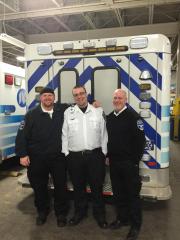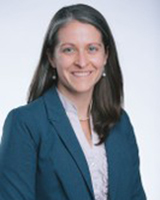A University of Wisconsin Oshkosh midyear graduate is savoring his public administration master’s degree and hopes to soon publish research that considers whether emergency medical service workers have implicit bias.
Alexander Trembley has been balancing a great deal with school, his career―and life.

Alex Trembley (center)
A resident of Inver Grove Heights, Minnesota, about five minutes south of downtown St. Paul, Trembley finished his UWO graduate program online―he graduated at midyear―and works fulltime as chief paramedic for North Memorial Health Ambulance. He had been caring for his ailing dad for over the past year and is grieving his recent death.
Trembley, an EMS worker the past 14 years, became interested in research that showed how communities of color experience higher rates of adverse health outcomes compared to white Americans.
To pursue the research, he was awarded a summer 2020 Civil Liberties Student/Faculty Collaborative Research Grant, providing a $3,000 stipend and $550 for supplies. He worked on the research under the guidance of Samantha Larson, assistant professor in UWO’s public administration department.
The study: Do EMS Workers Have Implicit Bias?
Larson said the reasons for higher rates of adverse health outcomes “are complex.” Trembley focused on implicit bias―”subtle and largely unconscious or semiconscious attitudes that influence behavior” as a contributing factor to healthcare inequality.
The questions examined included: To what extent do emergency healthcare workers exhibit racial implicit bias? Is implicit bias of emergency healthcare workers more prevalent than the general public? Does implicit bias of emergency healthcare workers vary based on demographic factors?
“One of the biggest challenges that I had was overcoming the amount of negativity,” Trembley said. “We got lots and lots of what I’m going to call hate mail. Threats of violence, curses thrown my way, etc.”
Though he was not satisfied with 1,500 responses (he emailed about 32,000 EMS workers in Minnesota and Wisconsin), the study was ended to preserve the mental health of Trembley and his wife, who also is a paramedic.
He learned that in his sample group, racial implicit bias was greater than the bias found in the general population, with Wisconsin providers having a slightly higher automatic bias than Minnesota providers.

Samantha Larson
“Although he chose to close the study with approximately 1,500 participants, that was actually a good sample size, statistically speaking,” Larson said. “Roughly, that means his study achieved a 95-percent confidence level with a 2.5-percent margin of error.”
Larson supervised the data collection phase of the project and guided development of the introduction, literature review and methodology sections for his report over the summer.
Trembley, calling Larson his “hero” said he thinks all MPA instructors are terrific, but “Dr. Larson is this unyielding advocate for equality. And that’s what public policy is about, right? Giving everyone the same shot at the policy/procedural American Dream.”
He presented his research virtually at the International City/County Management Association Unite conference, speaking on the study, the historical context of bias in both the EMS world and the Twin Cities Metro area. He had been working on the project for a year before the George Floyd incident but launched the study after.
Trembley said the conference went great.
“I don’t know how many people watched, but I heard from city managers in Texas, Virginia and Wisconsin who enjoyed the lecture and the work we did,” he said.
Trembley is a paramedic and currently works as a quality and education supervisor where he mostly focuses on law review, compliance and policy writing.
He said he was destined to his career in public service: his dad worked in municipal public works―”he showed me the value in taking care of communities”―and his mom worked in healthcare.
Trembley has applied to a doctor of public administration program that is mostly online (with some residency weeks) from Valdosta State University in Georgia. He said his “dream job” would be serving as a public safety policy adviser.
Learn more:
